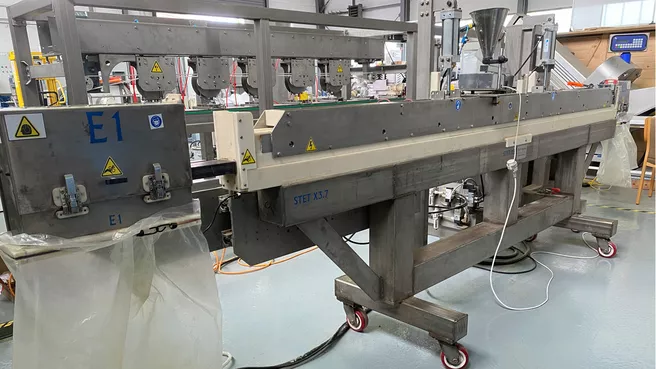“Protein quality and supply is a critical factor for global food security, nutrition, and the environment. New technologies for protein extraction are therefore essential,” says Professor Petra Först, Professor in the Department of Systems Process Engineering at the TUM School of Life Sciences in Freising – Weihenstephan.
Freising scientists are therefore participating in the “TRIBOTEC” project led by the German Institute of Food Technologies (DIL), which is researching protein enrichment and fractionation of agricultural by-products using dry triboelectrostatic separation technology.
Fraction with enhanced energy content
“Electrostatic separation is a novel environmentally friendly technology. “In this process, air currents are used to swirl ground materials and electrostatically charge them.” Explains Dr. Javier Perez Vaquero, a scientist in the TUM’s Department of Process Engineering. These physical forces separate the fine fraction enriched with protein from the coarse fractions enriched with fiber and starch. The result is two separate fractions, one of which has a higher protein content than the initial sample.
The advantages over conventional methods are: water and solvent free separation, lower energy consumption and operating costs, retention of the original functionality of the protein, and applicability to a wide range of materials.
Studies with canola and lupine seeds
In their experiments, Dr. Perez Vaquero and his team studied seeds of plants - in this case, canola and lupin seeds. The total protein gain ranged from 5% for canola meal to 20% for lupin meal.
Dr. Perez Vaquero states, “Our research has shown that higher masses (kilograms/hour) can be handled than previous studies have found. We can thus achieve mass processing of up to several kg/hour, which is a tenfold increase. Hence, we are one step closer to achieving a protein value high enough to be used in industry.”
“This research opens up enormous potential for the use of previously underutilized alternative protein sources,” exclaims Professor Först. Using this technology, by-products that regularly arise in the food industry, for example sunflower or rapeseed press cake as residues from oil production, can be enriched and further processed in the laboratory or in industry to provide a source of highly functional protein in a diverse range of products including animal and fish feed, and as protein for the production of meat substitutes. Furthermore, the process also makes it possible to develop completely new vegetable protein sources.
Further information:
Publication: Food Ingredients journal
The European Commission is pursuing several strategies under the European Green Deal. The aim is to accelerate a transition to a sustainable food system by promoting environmentally friendly and innovative technologies for the agri-food sector.
The TRIBOTEC project is carried out by a research consortium involving partner along the entire food chain: from raw material to product application, led by the German Institute of Food Technologies (DIL), Napiferyn Biotech (NFB), ProLupin (PL), and Mati:
https://www.eitfood.eu/projects/tribotec-protein-enrichment-and-fractionation-of-side-streams-by-dry-tribo-electrostatic-separation-technology-2020
The project is financially supported by the European Unit EIT Food.
Editing:
Susanne Neumann
TUM School of Life Sciences
Press and Public Relations
Scientific contact:
Dr. Javier Perez-Vaquero/ Prof, Petra Först
TUM School of Life Sciences
Chair of process systems engineering
Tel. +49 8161 71 5697
javier.vaquero@tum.de


